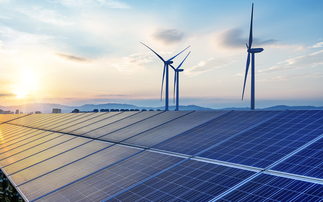But there isn't a one size fits all solution to the clean cooking challenge, warns Ashden's new CEO Harriet Lamb
Everyone in Britain's a masterchef these days. Students are adding lemongrass and a hint of chilli to their baked beans, or rustling up vegan delights that put me to shame. But for billions of people around the world, especially women, cooking is no fun - it's dangerous or even deadly.
Household air pollution from cooking, heating and lighting causes a staggering four million premature deaths a year, mainly in the poorest countries. That's more fatalities than malaria and HIV combined. Women, who still cook most of the world's meals, are most at risk. But this remains a hidden killer, too often overlooked by public health experts, NGOs and funders. While proven clean cooking solutions do exist, they are out of reach of many families.
A food seller cooks on an open air fire in Dar Es Salaam, Tanzania | Credit: Ashden
A global crisis
The numbers are stark - three billion people around the world depend on cooking with wood, charcoal, and animal dung on polluting open fires or inefficient stoves. In countries including DRC and Mozambique, less than five of people use clean fuels as their primary means of cooking. Every year, 400,000 children under five die as a result of household air pollution.
When I lived in southern India I knew a woman who was a landless labourer from a low caste. Every day she walked miles to work in the fields, coming home at night to start her second shift, collecting firewood and then squatting down to cook chapatis and vegetables for her family on an open stove, pushing sticks into the small fire. Smoke engulfed her tiny one-room home. She wheezed constantly, suffering from terrible asthma and a hacking cough, but had no money to buy medicines.
Emissions from household cooking also spread beyond the home and into the atmosphere, driving climate change. Inefficient stoves lead to higher fuel costs and greater deforestation, as more wood is needed to cook every meal - wood that women and children must spend hours gathering. It's a bleak story of blackened walls, scarred lungs and environmental damage.
Inaction on clean cooking is condemning a new generation of women and children to indoor air pollution, threatening significant deforestation and stalling economic growth. That's the verdict of the new energy progress report from Sustainable Energy for All, which is tracking progress toward UN Sustainable Development Goal 7: affordable and clean energy for everyone.
Think local to save lives
There is no single solution - no product ideal for every customer, from Cambodia to Costa Rica. Indeed, rural areas are littered with inappropriate clean cookstoves, designed for one context and pushed too widely, that women have tried and quickly abandoned.
But there a host of different stoves with now well-established technologies, all of which reduce the toxic smoke in people's homes. These draw on clever design features and make use of cleaner burning fuels, including biogases and pellets and briquettes made of compressed organic matter.
Many improved stoves don't eliminate the dangers entirely - particularly if they still rely on polluting fuel. However, even these improved stoves are often still too expensive for many families. Even though better cookstoves lead to lower spending on fuel, users face high up-front charges for the devices, and they simply don't have the cash. Clever financing options are one answer. The latest solutions often make use of smart meters and pay as you go technology, allowing people to get a stove for a low initial price and buy it outright over time.
Lessons from the clean cooking trailblazers
Genuine engagement with their customers marks out top clean cooking innovators. For example, Kenyan company BURN Manufacturing works closely with communities to find out what cooks need, then field test designs before manufacturing them in Africa's first modern cookstove plant. In India, when a marketing strategy based on the health benefits of Greenway Appliances' stoves fell flat, the company branded them as an aspirational product and pushed their time-saving potential - and sales took off.
Mexico's Sistema.bio have created a cheap and flexible solution for families with livestock which uses methane from decomposing animal waste. Cooking with this ultra-clean gas saves money and cuts carbon emissions, but also makes great organic fertiliser and helps families avoid hefty environmental fines for disposing of animal waste illegally.
These trailblazers reveal key lessons for governments and investors: focus on affordable solutions, insist that end-users (particularly women) are involved at every stage, and consider the wider rewards of action on clean cooking - the social, economic and health benefits. And while better cookstoves are welcome, we must also direct research and funding toward 100 per cent clean and safe solutions.
In the sector, opinion is divided on the topic of liquified petroleum gas (LPG), a cooking fuel now used by millions. While it delivers huge benefits - including protecting users' health, saving them money and tackling deforestation - it is still a fossil fuel, the production of which damages the environment and releases carbon that speeds up climate change.
While LPG has positive impacts, it should be a bridge to more sustainable solutions rather than an end destination. For now, those of us living carbon-intense lifestyles could think about cutting our carbon impact - so the world's poorest people can cook safely, something so many us take for granted.
Gender inequality kills
It's not hard to see why the dangers of clean cooking have been ignored for so long. Denied power, women will inevitably see their problems shoved down the list of national priorities. A lasting solution to the clean cooking crisis will only come with systemic change that allows marginalised people, including women, a seat at the table.
Change is urgently needed, not least because it would push progress word other Sustainable Development Goals such as SDG3 and SDG5 (healthy lives and gender equality). However, the clean cooking challenge reveals a sobering truth - that no technology or service, however brilliant, works in isolation. The path to our renewable energy future needs more than new products: we must have a just transition, putting fairness and justice at the heart of everything we do.
Harriet Lamb is the new CEO of Ashden







